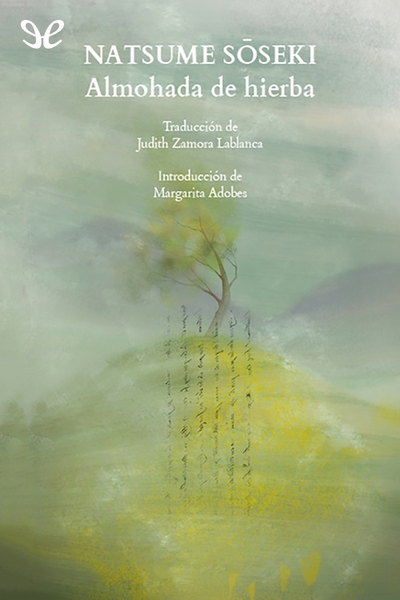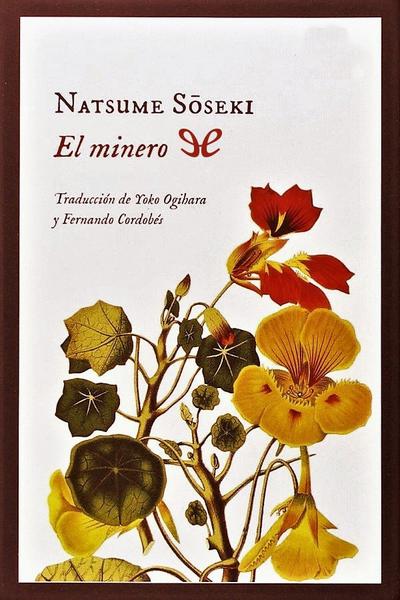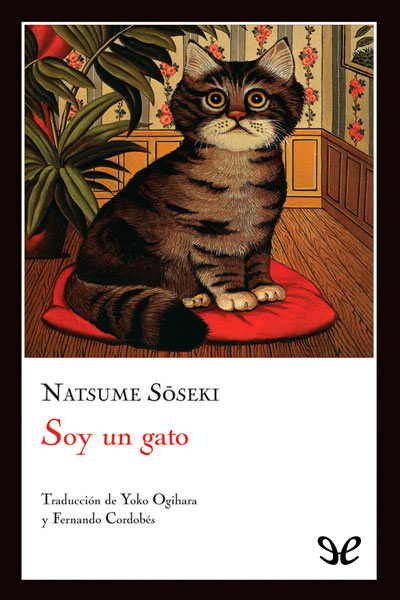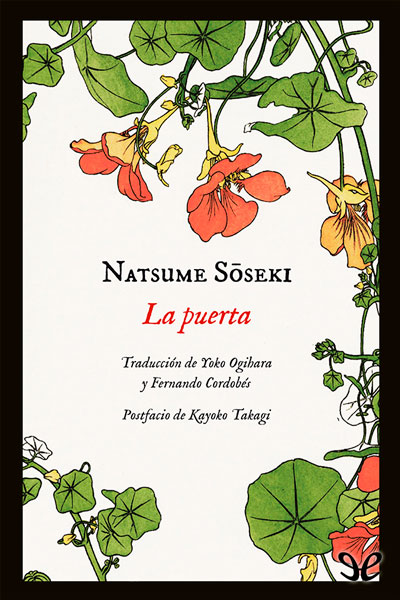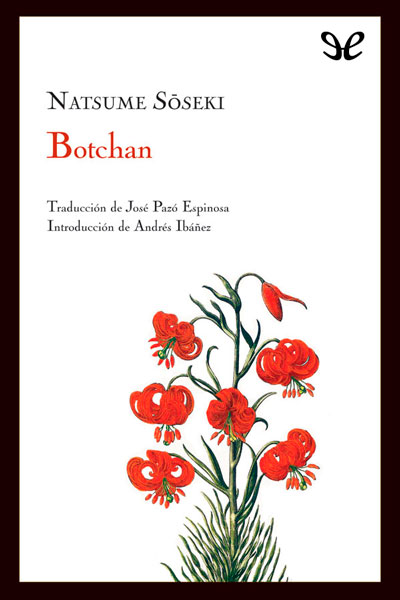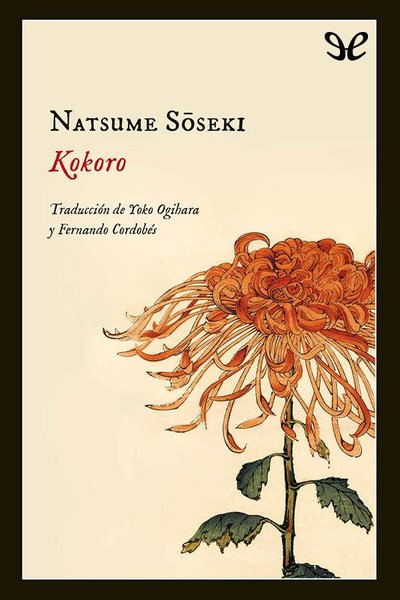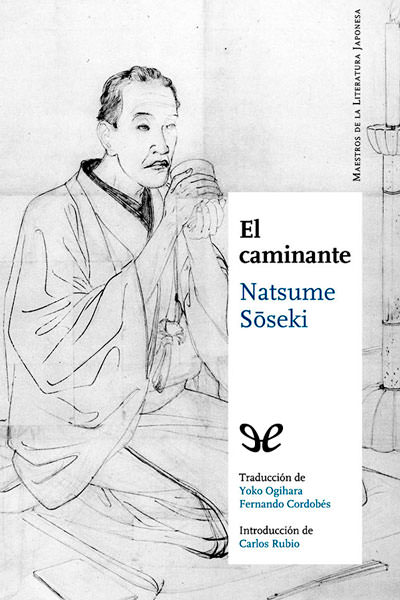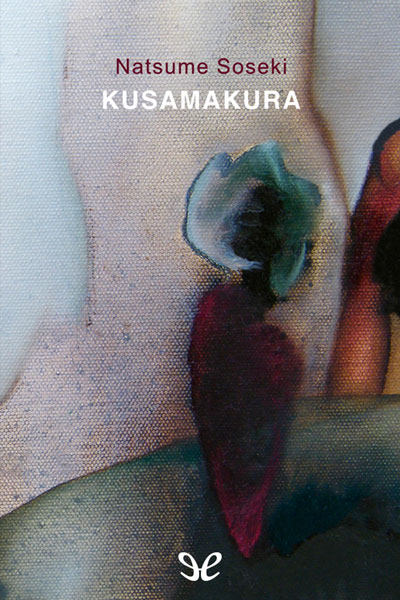oleebook.com
Botxan de S?seki Natsume
de S?seki Natsume - Género: Humor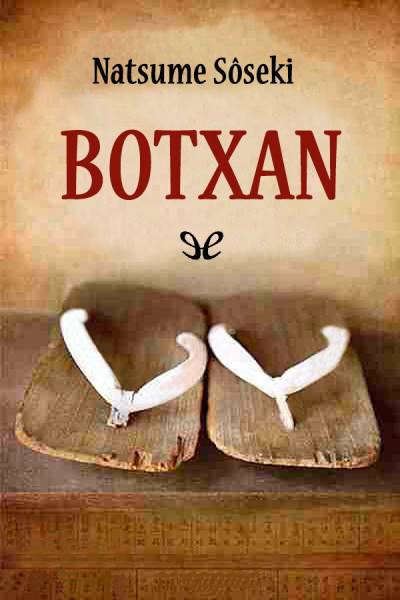
Sinopsis
Botxan, que en japonès equival a «senyoret», és una de les novel·les més populars del Japó. Lúcida, còmica i singular, Sôseki hi descriu la trobada o topada entre un jove mestre de Tòquio i una escola de lilla de Shikoku, al sud del Japó, a la qual és destinat. Alumnes i companys no gaire recomanables posen a prova la franca ingenuïtat del nouvingut, el «senyoret» de la capital, un personatge inoblidable.
La novel·la és una autèntica festa per als que els agrada divertir-se llegint i alhora una oportunitat per aprofundir en el coneixement de la natura humana. I Botxan és un dels grans herois còmics del segle XX, al costat de figures tan memorables com el bon soldat Svejk, Josef K., Ferdinand Bardamu o Jeeves.
Descargar
Descargar Botxan ePub GratisLibros Recomendados - Relacionados
Reseñas Varias sobre este libro
Now that I thought about it, though, I realized that most people actually encourage you to turn bad. They seem to think that if you don't, you'll never get anywhere in the world. And then on those rare occasions when they encounter somebody who's honest and pure-hearted, they look down on him and say he's nothing but a kid, a Botchan. If that's the way it is, it would be better if they didn't have those ethics classes in elementary school and middle school where the teacher is always telling you to be honest and not lie. The schools might as well just go ahead and teach you how to tell lies, how to mistrust everybody, and how to take advantage of people. Wouldn't their students, and the world at large, be better off that way?
Natsume Soseki, the author of this work, was so revered in Japan his face appeared on the 1000 Yen currency.
Botchan has grown up under the protective wing of a family servant named Kiyo. She is a fallen aristocrat who pins her hopes on Botchan making something of himself so she can continue to be his servant until she dies. She certainly has an exaggerated sense of Botchans character, but because she considers him her son we can forgive her having such misconceptions.
He goes to the University of Tokyo of Physics and emerges with a degree in math, not because he s math, but because he could pass the classes. a lot of young people he had no idea of what he wants to do, but I do have to give him credit for at least doing something while he was trying to figure out what to do.
He believes his best characteristics are common sense and a good grounding in morals, but they are somewhat offset by being impulsive, judgemental, and naive.
Botchan accepts a job teaching in the countryside far away from Tokyo. The adjustment is difficult mainly because he loses the fawning presence of Kiyo and he quickly alienates most of his coworkers by being condescending and overly critical of them. The same alienation occurs with the students who stalk him through the village and make fun of his eating habits. He s to eat...a lot.
Botchan didnt want to be a teacher. He was an indifferent student and became an indifferent teacher. Im alarmed at the number of teachers I meet that never d school, but fell into teaching for lack of other options. Most of our teachers in the United States come from the bottom third of graduates. I found some data from 2001, but more recent polling shows that the percentages from each third have not changed significantly. The breakdown for these graduates who became teachers is as follows: 23 percent came from the top third; 47 percent from the bottom third; and 29 percent from the middle third. In most European countries teachers come from the top third of graduates. That makes more sense to me. Part of our problem in the States people from the top third of graduates discover they can make much more money in the private sector with a smaller work load than they can teaching. In Europe teachers are among some of the best paid people in the country. That makes sense to me as well.
I digress, but this trend has been of concern to me and Botchan would probably fall into that bottom third category.
Botchan gives his colleagues nicknames. The principal becomes The Badger. The assistant principal is Red Shirt. There is also Porcupine, Hanger On, and The Squash face. Giving nicknames is a form of silent rebellion and makes him feel superior to most everyone in the echoing halls of his own head. There is a woman named Madonna, a beautiful woman that even the indifferent Botchan takes notice of.
Im not any good at describing what makes a woman gorgeous, so I wont try, but this one was definitely absolutely gorgeous. Somehow just looking at her made me feel I was cradling a ball of crystal that had been warmed in perfume in my palm.
The Madonna causes friction between the academics as they vie for her attention. It reminds me of when I was at the University of Arizona taking classes in the English department. Edward Abbey had been teaching there during part of my time there. I could never get into his class which was generally loaded with graduate students. Abbeys wife was allegedly sleeping with several teachers in the department. One was the highest paid member of the staff due to his ability to publish and the other was an ex-Jesuit monk. During one famous faculty meeting they came to blows. My money was on the Jesuit. It was difficult sitting in class looking at this notorious black eye at the front of the room and not laughing over the source of that injury.
The longer Botchan teaches his pride becomes more and more battered from a barrage of disappointments. His predetermined idea of how the universe is supposed to work becomes more cynical.
People operate on their s and diss, not on logic.
Natsume Soseki
This book is one of the best selling, best loved books of all time in Japan. It was published in 1906, but continues to be a source of amusement for new generations of Japanese readers. It is certainly a study in morality about the struggles between people with differing views of what living an honorable life means. Botchan is sure that his view of the universe is the correct one and those that interpret things different receive his disdain. It is excusable in a 22 year old and my hope is in the pages beyond this book that were never written that he learns more tolerance for the fallacies of others. My interest level increased the deeper I advanced in the book. I went from not really caring for Botchan to actually starting to understand him and even began to root for him. This is an early work by Natsume Soseki and I am very curious to read his later, more mature work.the-japanese172 s Magrat Ajostiernos634 4,273
RESEÑA completa
PURA DIVERSIÓN.
Si no habéis leído nada de Soseki empezad por 'Botchan' y no os arrepentiréis.
Es una lectura ligera pero llena de chispa que satiriza la experiencia de un joven profesor dando clase en una pequeña ciudad de provincias.
Me lo he pasado genial. Super recomendado!!!
Ya van 3 libros que leo de Soseki y está claro que seguiré con él ?2018 literatura-asiática116 s Jim Fonseca1,121 7,545
[Edited, pictures added 6/2/22]
This book from 1906, translated from the Japanese, is kind of a Tom Brown at Oxford set in Japan, and, in fact, the author did attend British schools, so maybe thats where he got the idea for the book.
A young man from Tokyo finds a job as a math teacher in a boys school out in the boondocks. He is a complete and total (insert your favorite anatomical word here, Ill say - ass). He is arrogant, looks down on the villagers, finds fault with everyone, talks down to his servants and landlords, cant make friends, etc.
Naturally he is the perfect target for pranks by the boys and intrigues by his colleagues to get rid of him. He seems oblivious to it all.
So of course, there is a lot of opportunity for humor in this setting and it is basically a humorous book. I always disd one subject as much as another. and remember when someone apologizes to you, he doesnt really mean it, and therefore you should only pretend to forgive him. The only way to make someone really apologize is to beat him until he truly regrets what hes done.
The book is kind of a Japanese classic, shown frequently in adaptations on television. I found it interesting for the local color of Japan in the late 19th-early 20th century.
During his relatively short life (1867-1916) the author wrote about two dozen novels and became Japans most famous author. He is credited with bringing the modern realistic novel into Japanese literature. Haruki Murakami said he is his favorite writer. He is most famous for a trilogy: Sanshiro, And Then, and The Gate, of which I have read the last two.
Japanese schoolboys, early 1900s, from alamy.com
The author on Japanese currency from bbc.co.uk
humor japanese-authors63 s Javier217 200
Hace ya tiempo que tenía ganas de leer algo de literatura japonesa, tan de moda últimamente: Murakami, Tanizaki, Kawabata Pero claro, ¡no me iba yo a leer lo mismo que el todo el mundo! Así que me decidí por Botchan, de Natsume S?seki, avalada por su condición de gran clásico de la literatura nipona contemporánea; una obra que puede presumir de seguidores: Kenzabur? ?e o el mismísimo Haruki Murakami cuentan a S?seki entre sus maestros. Para mi sorpresa, no he encontrado ni la sensualidad ni el delicado lirismo que buscaba. Ni siquiera ese sentido estético tan nipón lo hallé en Botchan. Por el contrario, se trata de una novela densa, directa, explícita y, además, bastante divertida.
Publicada por entregas en una revista hace ya más de un siglo, podría pensarse, por su sencillez y por su tono informal y, en ocasiones, humorístico, que la segunda novela de S?seki es una obra menor. En realidad, más que en el estilo o en el argumento, el interés de Botchan radica precisamente en él, en Botchan, su protagonista.
¿Tienes un amigo impresentable, de esos que no piensan las cosas antes de hacerlas, que siempre se meten en líos, que te avergüenzan constantemente con sus meteduras de pata? Pero, por otra parte, ¿tienes la seguridad de que ese amigo nunca te dejará tirado, que siempre podrás contar con él? Pues bien, ese es Botchan.
La novela narra, entre la ironía y la farsa, las tribulaciones de Botchan (que, entre otras traducciones posibles, equivaldría a niño mimado), un joven profesor, nacido y educado en Tokio, que acepta como primer destino una escuela en Matsuyama, una pequeña ciudad en la alejada isla de Shikoku. En realidad, aunque la ciudad donde transcurre la historia no aparece nombrada en el texto, la descripción coincide con Matsuyama, donde S?seki pasó un año enseñando en un instituto. Al parecer, S?seki monta el escenario en el que se desarrolla buena parte de la historia a partir de sus propias vivencias, pero la novela no es en absoluto autobiográfica.
Desde niño, he tenido una impulsividad innata que me viene de familia y que no ha hecho más que crearme problemas.
Esta breve presentación, con la que comienza la novela, contiene la clave del comportamiento de Botchan. Empleando las palabras de Andrés Ibañez en el prólogo, Botchan es obsesivo, acomplejado, ácido, descreído, irreflexivo, vengativo, irremisiblemente ingenuo. Siempre fiel a sus principios en cualquier circunstancia, es íntegro y justo según su particular código de justicia más allá de lo razonable. Y esta combinación, como se puede imaginar, le traerá muchos problemas a lo largo de la narración.
El caso es que Botchan quiere ser desconfiado; trata de ser astuto en el claustro y autoritario en el aula, pero la realidad es que todo el mundo le toma el pelo continuamente. Encima no cae bien a los demás, es arrogante e impulsivo, desprecia a los provincianos habitantes de Matsuyama tanto como a los presuntuosos que hacen gala de una cultura o de una posición superiores, lo que le convierte continuamente en objeto de bromas y víctima de conspiraciones.
Habla y actúa sin pensar, pero cuando sufre las consecuencias, las afronta con dignidad y, al igual que no tiene ningún miedo a enfrentarse a nadie, tampoco tiene reparos en reconocer su error y asumir sus responsabilidades.
Pronto me dio por sospechar que no iba a poder cumplir lo que se esperaba de mí. [ ] No me gusta mentir, así que no me quedaban muchas salidas. Debía enfrentarme a la situación, aceptar que mi presencia allí se debía a un malentendido, presentar mi dimisión inmediata e irrenunciable y volver a casa. Pero acababa de darle una propina de cinco yenes a los de la posada, y todo lo que tenía en la cartera eran nueve yenes y algo suelto. ¡De ninguna manera suficiente para volver a Tokio! ¡Ojalá no hubiese dejado ninguna propina! Me había comportado como un imbécil. Pero incluso con nueve yenes, pensé, me las arreglaría para volver a casa. Y aún en el caso de que no pudiera hacerlo, cualquier cosa me parecía mejor que mentir.
Pendenciero y vengativo por naturaleza, sin embargo es incapaz de cometer a sabiendas una injusticia, ni de permanecer indiferente al presenciarla. Es un perdedor vocacional; las pocas veces que su impulsividad o su ingenuidad no le abocan a la derrota, las escasas ocasiones en las que el destino le beneficia a él, la idea de que no ha obtenido la victoria en una confrontación directa y honorable le empuja a simpatizar con el derrotado y ponerse de su lado.
En cada conflicto, real o imaginado, Botchan se empeña en discernir quién es el bueno y quién es el malo, para saber por qué bando debe tomar partido. La imposibilidad de clasificar inequívocamente a cada habitante de su pequeño universo en este rígido esquema bipolar le condena a hundirse cada vez más en la confusión, incapaz de entender la complejidad del carácter humano. En última instancia, sus dificultades para integrarse en la sociedad tienen su raíz en el profundo rechazo que le causan la hipocresía y la doble moral que encuentra en casi todas las personas que le rodean, antes que en los fallos de su carácter.
Abundan las comparaciones entre Botchan y El guardián entre el centeno , en un intento, quizá un tanto forzado, de hacer más atractiva la primera. Es cierto que Botchan y Holden Caulfield comparten muchos rasgos de carácter y que ambos son incapaces de integrarse en su entorno de una forma natural y satisfactoria. Son dos antih??roes, desorientados e inadaptados, capaces de ganarse de inmediato el cariño del lector. Por lo demás, son dos obras difícilmente comparables, que tienen su origen en realidades culturales radicalmente distintas.
Analizada en su contexto histórico, en plena época Meiji, con Japón culminando su apertura a occidente, Botchan puede ser una parábola del conflicto social y cultural que nació del choque entre la modernidad y la tradición. Botchan es un hombre moderno, procede de Tokio, desprecia la cultura tradicional y viste al modo occidental; sin embargo, hace gala de valores tradicionales japoneses, como el honor y la rectitud. En cambio, los personajes de los que se ve rodeado son, en apariencia, mucho más tradicionales que él, pero carentes de valores.
En todo caso, al margen de otras interpretaciones, el principal atractivo de Botchan es, aparte del buen rato que pasarán leyéndola, la humanidad del personaje. Botchan es un arquetipo universal, un Sancho Panza con los elevados valores y el idealismo del Quijote, uno de esos personajes entrañables que todos podemos reconocer y por el que sentiremos un profundo aprecio, a pesar de su torpeza.63 s Sana191 92
??? ???? ????? ???? ??? ??? ????? ???.
???? ???? ? ???? ?????? ???.
???? ?? ?????? ??? ????.
?????? ??? ???? ?? ????? ???? ????? ??? ? ???? ?????????????? ?? ???? ???? ????? ?????? ? ??? ?? ??? ????? (?????)???? ?? ??????? ??????? ????????? ??? ????.
?? ?? ???? ????? ??????? ?????? ??????? ?? ???? ?? ?? ????? ???? ????? ?? ?? ?????? ????????? ??????? ???????
??? ????? ???? ?? ????? ?????? ? ????? ??????? ???? ?? ???? ?????? ????.
?????? ?????? ????? ? ?????? ????????? ???? ? ????? ??? ????.
??????? ????? ?? ????? ???? ?? ???? ???? ????? ??? ???? ? ?????????? ?? ?? ?????.
???? ?? ?? ?????? ???? ?????? ?????? ??? ? ???? ???? ?????
????? ?? ?????????? ?? ?????? ?? ???? ?????.
??????? ???? ?????? ?? ?? ??? ??? ? ????? ????? ?????? ?? ???? ?????? ??????.
????? ??? ?? ????? ????? ???? ??????? ??? ???????? ?????? ????? ?????? ????? ???(?????)? ??? ???? ???? ????? ?????.58 s mai ahmd451 3,079
?? ???? ?? ??? ???? ????? ???????? ???? ??? ????? ???????? ?????? ????? ???? ???? ????? ??????? ??????? ?????? ?? ??????? ???? ???? ?????? ??????? ??? ????? ????? ????? ?? ?????? ?? ??? ??????? ???? ????? ???? ????? ????? ?? ??? ??????? ????? ?????? ??????? ?????? ????? ?? ??????? ? ?????? ??? ??????? ?????? ?????? ??? ????? ????? ??? ??????? ?????? ???????? ??? ?????? ???? ???? ?????? ????? ????? ????
?????? ??? ?????? ??????? ??? ????? ???? ????? ???? ?? ?? ??? ??? ??? ????? ?? ??????? ????? ????? ??????? ?? ??????? ????? ???? ??? ???? ?????? ???? ?????? ?? ????? ?????? ??????? ??? ???? ?? ????? ????? ????? ???? ??? ???? ??????? ! ????? ??? ?????? ?? ??? ??????? ??????? ????? ??? ?????? ???? ??????? ??????? ???? ??? ????? ?????? ?????? ?????? ????????? ???? ???? ???? ?? ??? ???? ????????? ??????? ??????? !
?? ??????? ???? ????? ?????? ???????? ???????? ????????? ???????? ???????? ?? ??? ??????? ???? ???? ?? ??????? ?? ?? ???? ??? ?? ????
????? ??? ?? ???? ??? ???????
??? ??? ?????? ???????? ?? ??? ??????? ?????? ?????? ????? ?? ???????
??? ??? ??????? ??? ?????? ??????? ???? ????? ???? ?????? ??? ?????? ???? ????? ??? ?????? ??????? ???? ???? ??? ?? ?????? ???? ????? ??? ???? ???? ?? ???? ?????? ??? ?? ?? ?? ?? ???? ?????? ?? ???? ??? ??? ??? ?? ??? ??????? ??????? ???? ??? ????? ??? ??????
?? ???? ??????? ????? ?????? ???? ???????? ??? ????? ?? ????? ????? ?????? ?????? ????? ???? ????? ?????
???? ????? ?????? ???????? ????????? ???? ?? ???? ??? ?? ????? ???? ?????
????????? ???? ???? ??? ??????
????? ???? ?????? ?? ????? ????? ?? ??????? ????? ???? ?????? ????? ?????? ?? ????? ?? ?????? ?????? ?????
?? ?? ???? ??? ??????? ?? ??? ??????? ??????? ???? ???? ??? ?????? ???? ?????? ?????? ???? ????? ???????
??? ???? ????? ??? ???????
??????42 s Michael FinocchiaroAuthor 3 books5,856
Botchan is Japan's Tom Sawyer. It is read by schoolchildren across the country and has been the subject of innumerable TV sketches and parodies ever since Soseki wrote it early in the 20th Century. It is a coming-of-age story ripe with sarcasm and very entertaining to read. There is also a comic book version (or more). It is an early masterpiece of Soseki that does not have the depth of I Am A Cat but yet has the power of his prose to make a lasting impression and - since it is long before his more depressive period - show the strength of human nature.classics favorites fiction ...more46 s merixien603 457
Japon edebiyat? ile ilk tan??ma için uygun bir kitap olabilir. Oldukça basit ve kolay okunur-yormayan bir anlat?m? var. ?nsanlar? neden sevmedi?inizi hat?rlatmas? da art?s?. :)
3,5/5audiobook easy-read-books japanese-literature ...more31 s Bob Newman1,130 129
A rough diamond in Japan
In every country, people treasure certain images of themselves, whether they are accurate or not. In general, among numerous peoples the Chinese, Japanese, French, Russians, or English, there are so many personality types as to make such images totally stereotypical. In real life, we have to take people as we find them, not stick them into boxes. But in literature, from time to time, an author creates a character that so pleases the readers---perhaps because they identify with him so much---that he (the character) is immediately assigned a place in the national pantheon. BOTCHAN, the title character of the novel of the same name, is one of them. Created by Natsume Soseki in the early years of the 20th century, Botchan still delights each subsequent generation with his honest, sincere naiveté. He is a young Japanese man who may not understand much of what's happening around him, but he stands by his simple principles, dispensing with all unnecessary formality, falseness, and fakery. In a society where politesse, social obligation and a certain measure of conformity are highly stressed, it must be a pleasure to read the tale of a young man who says what he thinks, refuses to behave politely, and consistently acts as he decides best. If he is not much of a rebel by American or European standards, he is a much beloved "straight shooter" by tighter Japanese measure. This book has been popular in Japan since its first publication and I would guess the reason is that Botchan's behavior mirrors what Japanese would ' to be' more than the way they actually are. The rough diamond is a stock character in Japanese films and television shows from Mifune Toshiro's many "scungy-but-good hearted" samurai to the wildly-popular Tora-san. Westerners may not find much of a plot in BOTCHAN, but it is amusing, well-written, and enjoyable. It is a window on an older Japan far from bullet trains, animated adventures, and monsters that insist on attacking Tokyo. It is the story of a new young teacher in an isolated provincial town. I strongly recommend it for anyone, young or old. Botchan is one of those characters who will live forever in world literature.japanese-literature23 s Lucia Nieto Navarro 963 237
No habia leido aun al autor, aunque tengo Kokoro pendiente, pero me decidi a empezar por este y la verdad que ha sido un acierto, es una historia muy facil de entender, sin palabras complejas, sin muchos tecnicismos y bastante cortita.
Es una historia de un joven de Tokio, al que destinan a la isla de Shikoku a dar clases de Matemáticas ya que es profesor. Durante su estancia, va a conocer a otros profesores a los que ira poniendo motes ( algo que me ha resultado super curioso y divertido). Se dara cuenta de lo complicado que es adptarse a un nuevo lugar y a una nueva situación, pero le hará aprender que no tiene que fiarse de todo lo que le dicen, y no juzgar a las personas sin conocerlas.
Es una historia muy agil y muy amena, una novela de personajes sin grandes giros. Me ha gustado el el caracter del protagonista, ese comienzo de rebeldia frente a sus alumnos pero tambien ese carácter ingenuo.
Una novela que recomiendo si quieres empezar a leer algo de esta cultura. Rapido, agil y entretenido.29 s Mahtab163 53
????? ????? ? ???? ???. ?????? ???? ?? ???????? ?? ???? ?? ?????? ?? ?? ????? ???????? ?????? ? ?? ?????? ??? ?????? ????? ???. ?????? ?? ????? ??? ????? ????? ?? ?? ?????? ????? ???? ????? ????? ? ???? ????? ???? ?? ?? ?? ????? ??????. ??? ????.22 s John Velo172 54
Short review: it's a Japanese Catcher in the Rye
Japanese literature has been one of the first genres I remember reading and loving I fell in love with books when I read my first Murakami. Since then, I have ventured and looked for other Japanese authors and have found some that have appealed to me. This is my first Natsume Soseki novel, but sad to say, I am not overly impressed by it as I first thought I would be.
Botchan (or "boy master") tells us of a coming of age story of a mischievous boy born in a somewhat wealthy family from Tokyo. The first few chapters of the book entails of his experiences during childhood and how he was not favored as much as his older brother by his parents, and that the only person who cared for him was Kiyo, his servant.
In later parts of the book, Botchan's college and young adult life are expanded on. He eventually moves into the country from the city to work as a teacher, and naturally, this situation made him a target by his students (and some peer/fellow teachers) to play tricks on him. During this time, he maintains a close relationship with Kiyo through letters.
I must add that although most (if not all) of the characters besides the main one are very unable the protagonist for me, was not a character that I ended up loving either. Having grown from a rich family, he looked down on the villagers and even gave nicknames to some of them. He can be a prick, and that in a way reminded me of Holden Caufield from Catcher in the Rye.
All in all, this was a light and funny read. In the end though, I feel that I am lost at what the author is trying to tell me or what to make out of it. Not a memorable first read from the author but that will not hinder me from picking up another novel of his.
PS
I am amazed that I have read something written in 1906. Over 100 years ago!
Credits to the translator. I think he did a splendid job.20 s Hulyacln922 451
Çocuklu?umdan beri tam bir kaybedendim. cümlesiyle ba?l?yor Küçük Bey. Kendisinden umudunu kesen ailesini zamans?z yitiren,bir yere tutunmaktan çekinen; en sonunda çareyi ö?retmen olmakta bulan biri dad?s?n?n Botchan?.
.
Ö?retmen olarak gitti?i ilk yerde i?ler biraz kar???yor. Ne ö?renciler ne de ö?retmenler kabulleniyor yeni geleni.Bu süreç boyunca yeni ö?retmenin akl?nda ise sadece Kiyo var. Fedakar ve ona güvenen tek ki?i olan dad?s?..
.
S?seki gündelik olan? anlat?yor gibi göründü?ünde; sat?r aralar?na gizliyor edebi gücünü. Dönü?üm sürecindeki Japonyay?, bir samuray?n lokantaya çevrilen evi üzerinden anlamland?rabiliyoruz örne?in.
Kat? kurallar?n çözülüp esnedi?ini, ancak bu esnekli?in fazla bol geldi?ini de görüyoruz..S?seki basitlikteki güzelli?i her defas?nda parlat?yor.
.
Mariko Erdo?an ve Hüseyin Özkaya ortak çevirisini okuyoruz. Önsöz olarak sunulan, ça?da? Japon edebiyat?n?n do?u?u üzerine Selçuk Esenbel çal??mas? da bir di?er güzel detay~20 s Katie LumsdenAuthor 2 books3,282
I really enjoyed this one - a bit odd, but very funny! It's a kind of coming of age story, looking at a young man from Tokyo dealing with the gossipy strange world of a small town when he moves there to be a teacher. It kind of reminds me of Decline and Fall by Evelyn Waugh.20 s Yousra 708 1,321
???? ????? ?? ?? ????? ???????? ... ??? ???? ?? ??? ????? ??????? ?? ??????? ??????? ??? ??????? ??? ??????? ?????????? ???? ?????? ?????? ??? ???? ?? ??? ????????? ?? ???? ?????? ????? ?????? ?? ???? ?????? ????? ?????? ??????? ??? ???? ???
?? ??????? ???????? ??? ?????? ??? ?????? ???? ??? ??????? ?????? ?. ?. ??????? ??????? "?????? ?? ??? ???????" ... ???? ???????? ????? ... ???? ?? ??? ????? ???? ?????? ??????? ??? ???? ????? ??? ??? ????? "??????" ??? ?? ????? "?????? ?? ??? ???????" ??? ???? ?? ????? ??? ??????? ... ??? ???? ???????? ???? ?? ???? ???? ??? ??????? ?? ?????? ?? ??? ??????? ??? ???? ?????? ?? ????? ?????? ?????? ????? ????? ????? ??? ???? ????? "??????" ?? ???? ??? ????? ?? ????? ???? "?????? ?? ??? ???????"... ??? ????? ??? ??? ?? ????? ?????? ??????? ????? ???? ??? ?????? ??????? ??????
?????? ??? ?? ?????????? ??? ??? ????? ??????? ?????? ??? ?? ???????? ???? ????? ???? ???? ????? ??? ?? ??? ????? ???? ????
???? ?? ????? ?????? ??? ?? ??????? ??????? ??????? ... ??? ???? ?? ??? ???? ???? ?? ????? ???? ?????
?? ??? ???? ?? ????? ?? ????? ?????? ?????? ????? ???? "???? ?????" ???? ???? ... ???? ????? ????? ???????? ?????? ??? ???? ?????? ????? ... ???? ??? ??????? ?? ?????? ??? ????? ??? ??????? ???? ???????? ?????? ?????? ?? ???? ?? ???? ???? ????? ... ?? ?????? ?????? ?????? ???? ?????? ???? ??
?????? ??? ??? ???? ???? ???????? ??? ???? ????? ?????? ?? ?????? ????? ?? ???? ??? ... ????? ??????? ???????? ??????? ??????? ???????? ?????? ??????... ??? ??? ?? ????? ???? ???? ?? ??? ?? ????? ???? ??? ????? ?? ??? ???????
?????? ???? ?? ???? ??????? ?????? ?????? ??????? ??????? ?????? ??????? ?????? ?? ?????? ?? ???? ????? ????
????? ????? ??? ?????? ???? ????? ??? ????? ?? ????? ??????
japanese-lit ?????-?????19 s Tim477 755
Now that I thought about it, though, I realized that most people actually encourage you to turn bad. They seem to think that if you don't, you'll never get anywhere in the world. And then on those rare occasions when they encounter somebody who's honest and pure-hearted, they look down on him and say he's nothing but a kid, a Botchan. If that's the way it is, it would be better if they didn't have those ethics classes in elementary school and middle school where the teacher is always telling you to be honest and not lie. The schools might as well just go ahead and teach you how to tell lies, how to mistrust everybody, and how to take advantage of people. Wouldn't their students, and the world at large, be better off that way?
This is a wonderful, though often very frustrating read. Its not frustrating because it is difficult, far from it (the translation is quite the page turner) but because I found myself nodding at the above quote. I did somewhat look down upon our unnamed narrator (known only as Botchan) and I admire the character in equal parts. The book is a morality story that shows the reader (or at least this reader) their own unpleasant side.
I found his character childish. I sat there the entire time feeling that, had I known him in real life, I would find him insufferable and wouldn't be able to stand to be around him. He's loud, brash and seems to think he's always in the morally right... and with a few exceptions brought on by misunderstandings, he is in the the right. That said, he is often right in a way that goes against society and the way one is supposed to act. At times I would root for him and others cringe and feel that awkward embarrassment that sitcoms seem to thrive on. That moment when the character does something baffling, everyone recognizes it, and you just laugh awkwardly.
Though it is frustrating, Natsume S?seki has also caught so much truth in these actions that I can't help but be impressed. He understands human nature, good and bad, putting them on display from all characters. It is unsurprising that the novel is a classic in Japan (often cited as one of the author's most popular books and frequently found in school curriculum). It is a classic that has lost none of its charm since it was published over 100 years ago.
Now I do want to say a bit about the translation. Overall, it is wonderful, very readable and accessible to modern English reading audiences. That said, I question a few bits. First off, the principal's nickname is translated as "Badger" rather than "Tanuki." The translator states in his introduction that this was to be more accessible to English readers who may not know what a tanuki is... but in changing this he defeats part of the point of said nickname. A tanuki in Japanese myths is often a master of disguise or shapeshifting creature, this ties in with the principal's golden tongue, able to mislead or at least argue around the topic, distracting and laying blame where it should not be while keeping the school's reputation. I find badger does not bring to mind any of these connotations, and indeed makes me think of a different sort of personality. This wouldn't be that bothersome if the translator was going entirely for an English speaking audience and hoping they wouldn't need to look anything up, yet he leaves the often used phrase "na moshi" untranslated. I had knowledge of a tanuki, but had no clue what that meant and had to look it up online. This is what I found:
"Na moshi (????) is the Matsuyama dialect's equivalent of de gozaimasu-ne (????????), a phrase that doesn't quite translate into English. Think of it as a formal way to say desu-ne (????), for which there is no good English equivalent. "Isn't it?" comes close."
So yes, this could remain untranslated, and used frequently, but the nicknames could be changed rather unsuitably for the ease of English speaking audiences. I personally find that quite baffling.
In closing: despite some questionable aspects to the translation, and a few truly cringe worthy moments from our protagonist, I found this a delightful read. There are some genuinely comedic moments, that capture our human interactions with each other quite well, both the good and the bad. It shows us people are the same everywhere, suffering from many of the same flaws. It's an entertaining read and well worthy of its classic status. 1900s classic japanese ...more16 s ????227 425
"???? ????? ??? ????? ??? ????? ????? ??????? ?? ???? ??????? ????? ?? ??? ??? ????? ?? ???????? ??????? ??????? ??? ???? ???????? ???? ???".
???? ?????? ??? "????" ??????? ???????? ??? ??? ???? -??? ?? ????- ??? ???? ??? ????? ?????? ????? ?? ????? ????? ?????? ?????? ????? ????????..
?????? ??? ????????? ?? ???????? ??? ?????? ??????? ????????? ???? ??????? ??? ???? ?????? ??? ???? ?? ????? ???? ??? ??????? ?? ?????? ???? ??? ?????? ???? ??????????? ????????? ?????? ????????. ??? ?????? ?????? ?? ???? ???????? ?? ???? ???? ??? ?????? ???? ??? ?? ???? ???? ?????? ?????? ??? ????? ?? ?? ???? ??? ??? ????????? ?????? ???????? ??? ???? ??????? ??????? ????? ???? ??????? ?????????.
"?? ?? ???? ????? ????? ?? ???? ???? ???????? ????? ??? ????? ?? ??? ????? ?? ?????".
"?? ???? ??? ??? ?????? ???? ?? ??????? ???? ?????? ??????? ??? ??????? ???? ???? ???? ??? ???????".
?? ???? ????? ???????? ?????? ??????? ??????? ??? ???? ???? ???? ????? ?? ??????? ?? ??? ????? ??????? ?? ???????? ???? ?? ??????? ??? ??????? ????? ??? ????? ???????? ??? ???? ????? ????? ??????? ?????? ??? ???? ??????? ??????? ?????? ???? ???????? ??????? ??? ???? ???? ????? ????? ????? ?????? ???????? ?????? ??? ?????? ?????? ??????? ?????? ??????? ??? ?????!
?? ?? ???? ??? ???? ?????? ?? ????? ?? ?????? ??? ?????? ????? ???? ????? ???? ?? ????? ?????? ?? ?????? ??? ???".
"?? ??? ????? ???????? ?????? ????? ???? ?????????? ???? ???? ??? ?? ??? ???? ??? ?? ??? ??????".
"??? ???? ???? ?????? ??? ???? ???? ????? ????? ??????? ????? ?? ??? ???? ??? ???? ??? ???? ?????".
"???? ?? ????? ??? ?????? ?????? ????? ???? ???????! ??? ??? ????? ??????? ????? ??? ?????? ?????? ??????".
??? ???? ?????? ?????? ?? ????? ??? ??????? ??? ??? ???????? ??? ??????? ?? ?????? ??????? ??? ?????? ???? ????? ??? ?????? ?????? ???? ???????? ?? ?????????
????? ?????? ???? ?? ???? -?????? ???? ????? ??? ???? ??? ???????? ???????-: ???? ???????? ???? ?????? ?????? ??? ?????? ????? ????? ?????? ??? ?????? ??????? ?? ??????? ???: "???? ?? ?????? ?? ????? -???? ??????? ?????? ??????- ??? ??? ??? ?????? ?????? ??????? ???? ?????? ??? ?? ???? ????? ????? ???????..."? "... ????? ???????? ????? ??? ?????? ????? ???? ?? ??? ????? ??? ????? ?????..."
??? ?????? ?????? ?? ???? ??? ????? ?? ????? ??? ???? ?????? ???? ?????? ??????.
??????? ??????? ??? ???? ??? ???? ?????? ??? ???? ????? ????: ??? ????? ?? ??? ??????? ?????? ?????? ???????? ?????? ???? ????? ??????? ??????? ???? ????? ?????? ??? ???????? ???? ?????? ??????? ??? ??????? ??????? ???????? ??????? ??????? ??????? ??????? ??? ???? ???? ?????? ?? ??? ????? ?? ????? ?? ??? ???????? ????? ?? ??????? ???? ????? ?????? ???????! "?????? ?? ?????? ?? ??? ???????! ??? ???? ???????! ?? ?????? ?? ?? ???? ??? ?? ??? ?? ???? ??? ???? ?? ???? ?????" ???????? ???? ????? ?????? ????? ?? ??????? ???? ??????? ????? ?? ?????? ?????? ??? ??? ???.2020 ?????? ????????? ...more16 s Loretta344 212
Im not usually a fan of books that dont have a lot of dialogue. Description is only good when the writer draws you in immediately which thankfully Natsume S?seki did. That being said I definitely d the beginning of the book more than the latter. The beginning had an interesting story but once Botchan got to Matsuyama it got tedious and I began to lose interest.
Was going to give the book four stars but opted for the three based on the predictable ending.classic japanese march-2023 ...more15 s José Luis268 62
Cuando leí en la sinopsis que este libro se comparaba con El guardián entre el centeno sentí bastante curiosidad y lo cierto es que no me ha defraudado la historia. Un libro que se podría encuadrar perfectamente dentro de los cánones de la literatura juvenil pero que no defraudará a lectores adultos. Irreverente, descarado, poco serio... y además escrito hace más de un siglo. Una historia hilarante y delirante con personajes de lo más pintoresto y grotesco a la vez, con un humor distinto al que estamos habituados en occidente.
Una historia con una crítica social muy fuerte detrás mostrando los contrastes y contradicciones en la sociedad japonesa de principios del siglo XX.
Me ha parecido una historia divertida pero también es cierto que puede resultar chocante porque no estamos habituados a este tipo de literatura.14 s A.378 48
Quién no conoce a alguien como este Botchan: narcisista, ofendible en grado extremo, brutalmente honesto. Pero hay algo en su inapelable sentido de justicia y en esa ingenuidad de creerse un maravilloso regalo para el resto de la Humanidad, que lleva a que resulten queribles (OK, no es cierto, la mayoría no son queribles. Pero este es el personaje de un libro)
Botchan es un joven de Tokio que llega a como profesor de matemáticas a una escuela secundaria en una pequeña ciudad, en una remota provincia de Japón. La tosquedad y la simpleza de ese ámbito rural, sus rústicos alumnos y sus siempre criticables colegas, lo sacarán continuamente de sus casillas. Y no es difícil sacarlo de sus casillas. Irritable y socialmente torpe, será blanco de chismes en el infierno grande que son los pequeños pueblos.
Un clásico muchas veces comparado con Tom Sawyer (supongo que en lo clásico) y con el Guardián entre el Centeno, entre otras. Personalmente, el protagonista me recuerda un poquito a Ignatius Reilly de "La conjura de los necios". Desesperante y divertido. Si, si, porque es un personaje de libro.13 s Praj314 855
Botchan's story of his life as a middle-school teacher in the Japanese countryside is simple and entertaining.Botchan a complete stranger to compliments and praises in his childhood grows to be a loner with a 'I don't care' attitude.He gets confused or rather angry with the subtle manipulations he experiences later in life. The only emotional attachment he has and loves is that with his childhood maid Kiyo, who never stops from showering motherly love and praises on him.
The writings concentrates on the innocence and lack of insight experienced by a rookie when encountered with seasoned players(in this case teachers).Although the slow paced narration made me lose patience, it was quickly recovered with peals of laughter brought by the humorous incidents played in the school.The politics and manipulative aspects of the school were interesting and agreeable. It is a quick read. The best part about reading a classic is that it makes you understand the foundation of a culture and its attributes.ns ???13 s George IlsleyAuthor 12 books275
It's never too late to achieve the traditional education of a Japanese high school student, is it? I wonder if they still read this one.
This Japanese classic is roughly the equivalent of Catcher in the Rye, in that it is now considered YA and pokes fun at received wisdom. However, Botchan (the nickname of the protagonist) is so sweet, to my eyes the rebellion is so delicately muted, so Japanese, that at most the book reads as gentle humour.fiction humour japan ...more13 s E. G.1,112 777
Introduction
--Botchan4-star fiction japan ...more13 s Vonia611 93
This is lauded as the Japanese "Catcher in the Rye". I agree with this assessment. I have been trying to decide which one I hated less. Hated might be a strong word. Nevertheless, the character of Holden Caufield, Botchan is very candid, naïve, and narrates with a "fuckall" flair. From what I remember, Botchan seems a lot more close minded and discriminative, as opposed to Holden's lack of intelligence and mental problems. Holden is more against society in general, whereas Botchan has a moral code to which he feels he needs to adhere. Despite his personality flaws, he has a respectable position that he voices well: "I realized that most people actually encourage you to turn bad, They seem to think that if you dont, youll never get anywhere in the world. And then on those rare occasions when they encounter somebody whos honest and pure-hearted, they look down on him and say hes nothing but a kid, a Botchan. If thats the way it is, wouldnt it be better if they didnt have those ethics classes in elementary school and middle school where the teacher is always telling you to be honest and not to lie. The schools might as well just go ahead and teach you how to tell lies, how to mistrust everybody, and how to take advantage of people. Wouldnt their students, and the world at large, be better off that way?"
The narrator is unnamed. The literal translation is "young master", but is used somewhat ironically, since he does not come from a rich or prestigious family. His mother died when he was young, and his father died some years after that, leaving Botchan the minimal six hundred yen inheritance. Aside from its literal meaning, Botchan can be used to indicate naivety, which I would definitely say our protagonist is. This is one of the most frustrating things about his character. How gullible he is, believing pretty much what everyone says, then immediately reacting based solely on his emotions. He even voices to the reader how he does not care about logic, because we all listen to our emotions anyway. That may be true to some extent for some individuals, but the fact that does not even try to recognize the flaw in his reasoning is frustrating. His other character flaw is his closed mindedness. To the point that in the event that I were to meet him in real life, I would have a difficult time not giving him a piece of my mind. Not very nicely. I respect his candidness, but the pervasive discrimination and persistent negativity were unacceptable. He always has something negative to say about everything, and seems genuinely surprised when he sees the positive.
A great example of the difficulty inherent in appreciating a book to its full extent when the protagonist is unlikable, even hateable. Whereas Holden Caufield had me irked and therefore uninterested in his story, Botchan had me passionately infuriated with who he was, his thoughts, and philosophies, ironically leading me to being highly involved in his story. I will say that, un the "against the system" theme in "Catcher in the Rye" (which held minimal interest to me), I relished the interesting take on the themes of morals and personal integrity in "Botchan". It also addresses the classical themes of Japanese literature (giri, burden of duty versus ninjo, human feeling), in addition to individual struggle, loneliness, and questions of social direction and cultural identity.
In the end, what really makes this book successful is the characters. On the one hand, Botchan's (mostly) derogatory nicknaming of all of the other characters is one of the things that I disd about his personality. On the other hand, it cannot be denied that it gives the story flair and humor.
Compared to other translations I have seen, this one by Glenn Anderson seems to be a better one. Notable is the afterword in which he explains his meticulous choice of Nicknames for each of the characters, and what each of the original words actually mean. He uses different words than past translations, and I felt they were much closer the original meaning. A great example why translating is such an art.
**** Spoilers ****
via Wikipedia:
Botchan (young master) is the first-person narrator of the novel. He grows up in Tokyo. His parents favor his older brother, who is quiet and studious. Botchan is also not well regarded in the neighborhood. Kiyo, the family's elderly maidservant, is the only one who finds anything redeeming in Botchan's character.
After Botchan's mother passes away, Kiyo devotes herself fervently to his welfare, treating him from her own allowance with gifts and favors. Botchan initially finds her affection onerous, but over time he grows to appreciate her dedication, and she eventually becomes his mother figure and moral role model.
Six years after his mother's death, as Botchan is finishing middle school, his father falls ill and passes away. His older brother liquidates the family assets and provides Botchan with 600 yen before leaving to start his own career. Botchan uses this money to study physics for three years. On graduating, he accepts a job teaching middle school mathematics in Matsuyama on the island of Shikoku.
Botchan's tenure in Matsuyama turns out to be short (less than two months) but eventful. His arrogance and quick temper immediately lead to clashes with the students and staff. The students retaliate excessively by tracking his every movement in the small town and traumatizing him during his 'night duty' stay in the dormitory.
Mischief by the students turns out to be just the first salvo in a broader web of intrigue and villainy. The school's head teacher (Red Shirt) and English teacher (Uranari) are vying for the hand of the local beauty, and two camps have formed within the middle school staff. Botchan struggles initially to see through the guises and sort out the players. After several missteps, he concludes that Uranari and the head mathematics teacher (Yama Arashi) hold the moral high ground in the conflict. Red Shirt, who presents himself as a refined scholar, turns out to be highly superficial and self-serving.
As the story progresses, Red Shirt schemes to eliminate his rivals. He begins by having Uranari transferred to a remote post on the pretext of furthering his career. Next he uses a contrived street brawl and his newspaper connections to defame both mathematics teachers (Botchan and Yama Arashi) and to force Yama Arashi's resignation.
Botchan and Yama Arashi realize that they cannot beat the system, so they scheme a way to get even. They stake out Red Shirt's known haunt, an inn near the hot springs town, and catch him and his sidekick Nodaiko sneaking home in the morning after overnighting with geisha. With his usual eloquence, Red Shirt points out that they have no direct proof of any wrongdoing. Botchan and Yama Arashi overcome this technicality by pummeling both Red Shirt and Nodaiko into submission on the spot.
After dispensing justice with his fists, Botchan drops a letter of resignation into the mail and immediately heads for the harbor. He returns to Tokyo, finds employment, and establishes a modest household with Kiyo. When Kiyo passes away, he has her respectfully interred in his own family's grave plot.coming-of-age foreign-translated high-school ...more12 s Elçin Arabac?149 175
Ana karakter tam bir salak genç erkek kafas?. Üstüne ?ap?alcas?na kibirli, ta?ral?lar? küçük gören üst s?n?f havas? var. Ama ayn? karakterin salakl???n?n öz bilinciyle konu?mas?, tecrübelerinden ö?renmesi ve sa?lam bir dürüstlük anlay??? olmas? çok ho?uma gitti. Üstüne olaylar 20 yy ba?lar?nda modernle?me sanc?lar? çeken Japonya'da geçiyor ki Natsume Soseki romanlar?n en sevdi?im özelli?idir arka plandaki Japon modernle?me sanc?lar?. Bizdekine çok benzer. Gerçi Türk edebiyat?n?n ayn? dönem yazarlar?n?n da eserlerinde erkekler de ayn? ?ekilde salak, eril ve kibirli olsa da, do?rusu böylesi kara mizahi bir salakl?k özbilinci ve dürüstlük övgüsü yok. Çok ?irin bir k?sa roman.fiction12 s Abdyka Wirmon70 9
Sungguh.
Saya hidup kembali.
Telah lama saya merindukan sebuah bacaan seperti ini. sungguh. ini seperti bertemu kembali dengan kekasih yang telah lama terpisahkan. oh betapa melegakannya. sungguh.
Jauh sebelum membaca buku ini, saya telah sadar dan yakin kalau Soseki Nasume akan membuat saya masuk dan terlempar kedalam karyanya. dan ini terbukti langsung lewat buku ini. jika boleh beranalogi, membaca Botchan ini seperti menaiki pesawat jet melintasi khatulistiwa di sore hari yang cerah. yang artinya hhmm.. saya juga tidak tahu, tapi itu yang saya rasakan, yaaahh.. gitulah..
Botchan akan menyuguhkan kejujuran dunia yang keras, semua hal terlihat pelan namun sebenarnya semua ini berjalan sangat cepat, kesadaranmu akan membuat semua realitas terasa pelan dan mencekam. bagaimana tidak, banyak konflik disuguhkan dengan pedas dan dingin disini. tidak enak namun sangat indah. kau akan menyaksikan banyak hal yang saling bersinggungan dan tidak jarang saling menikam dan bertabrakan. tolong jangan berbohong bukankah manusia menyukai ini, menyaksikan sebuah kehancuran dan penderitaan adalah sebuah tontonan yang kita sukai. itu kenapa begitu banyak berita kriminal dan bencana disiarkan di TV, ratingnnya tinggi. serius lho..
Jika kamu belum membaca buku dan bertanya "bagaimana cerita buku ini?" hhmm.. saya hanya bisa menjawab "jangan pedulikan ceritanya". siapa yang akan peduli dengan cerita Botchan ini, ceritanya terlalu biasa dan sangat sederhana, ini hanya cerita tentang kehidupan dan pemberontakan akan realitas yang ada. semua orang pasti mengalaminya, namun masalahnya apakah kita bisa melihat dunia dengan cara seperti di Botchan ini, apakah kita bisa selalu jujur seperti tokoh utama dalam buku ini, apakah kita bisa menolak semua hasutan dan kemunafikan seperti yang disajikan dengan sangat gemilang oleh penulis buku ini, apakah kita bisa menjadikan idealisme sebagai harga mati, apakah kita bisa memberikan rasa sayang yang tulus dan berjanji untuk tetap setia, apakah kita bisa tetep kuat saat semua orang mencoba menjatuhkan? jika jawabannya tidak, cobalah belajar dari buku tipis ini. seperti kata mendiang ayahku, "buku adalah guru terbaik"
Oke, saya sadar, saya tahu kalau review ini kedengaranya berlebihan dan bertele-tele, namun seperti inilah kejujuran yang bisa saya berikan untuk buku ini. terima kasih.
NB: untuk yang telah pernah membaca buku ini diharapkan komentarnya, semoga kita bisa berbincang-bincang, bercakap-cakap, atau kemungkinan terburuk, saling mencela :D
fiction shocking12 s Deniz Balc?Author 2 books704
Bugün tesadüfen rutin kitapç? gezmelerinde, uzun süredir arad???m, yeni bask?s? yap?lmad??? için edinemedi?im 'Küçük Bey'i buldum ve eve gelince elimdeki kitaplar? b?rak?p okumaya ba?lad?m. Hayat?n bana ufak bir sürprizi oldu bu.
Natsume Soseki, Meiji Restorasyonu döneminde edebiyatta, Japon romanc?l???n?n modernle?mesi için çok saba sarf etmi? bir isim. Türkçe'ye henüz iki eseri kazand?r?lm?? durumda. Di?eri de 'Gönül (Kokoro)'. Ancak bu kitaplar?n bask?s?n? bulabilmek mucize gibi bir ?ey. Di?er kitaplar? neden çevrilmiyor, Soseki'nin sat?? olarak bir nüfuzu olmaz gibi mi geliyor bilmiyorum. Asl?nda iyi bir yay?nevi taraf?ndan Japon Edebiyat?n?n en önemli isimlerinden biri olan Soseki'nin bütün eserleri yay?mlansa ne güzel olur.
Kitaba gelecek olursam, tipik bir geçi? dönemi eseri. Bizim Türk Edebiyat?m?zda Re?at Nuri Güntekin'in 'Çal?ku?u' ile kapatt??? idealist bo?lu?u, Soseki'de Japon Edebiyat?nda kapatm??. Ancak Soseki idealist oldu?u kadar ayn? zamanda realist de. Karakterleri ve ak??? o kadar sade ve gerçek i?lemi? ki okurken cidden çok keyif ald?m. Ya?ar Kemal'in baz? k?sa romanlar?nda görülen sadelik ve içtenlik var 'Küçük Bey'de.
Sonu Japon romanc?l???nda olumsuzlama olarak tan?mlansa da bence çok gerçek ve okuyucuyu memnun edecek ?ekilde tasarlanm??. Ben çok keyif ald?m.
8/10
japon-edebiyat?12 s Dave3
Very funny especially if you have ever been a teacher. It kind of reminds me of the trials and tribulations of Torgodevil in Korea (especially in the beginning). The novel details all the stupid politics and rivalries between teachers and the administration not to mention the students themselves, who are spoiled and unruly. The narrator is also interesting in that he is from Tokyo and looks down upon the small town as provincial and unsophisticated.
Though you can identify with him, the main character is a bit of a prick himself having been doted on my his maid Kiyo all his life. He is her "Botchan" the Spanish señorito is a title given to spoiled boys of rich families.
So he goes on giving unpleasant nicknames to everyone at the school: Badger(Tanuki), Redshirt (Akashatsu), Porcupine (Yamaarashi) etc . . .
And even refers to them this way in regular conversation.
Overall, a very good light read.
Now we only await the Korean version from Torgodevil.12 s Annie?242 72
No haré una reseña, pero como siempre dejo una cita, aquí está:
"Educar no es sólo impartir conocimientos. Educar es también forjar caracteres nobles, rectos y con fuertes principios, en los que no cabe la vulgaridad, la superficialidad y la arrogancia." 2018 reto-anual-201812 s Matthew Ted862 849
Autor del comentario:
=================================
